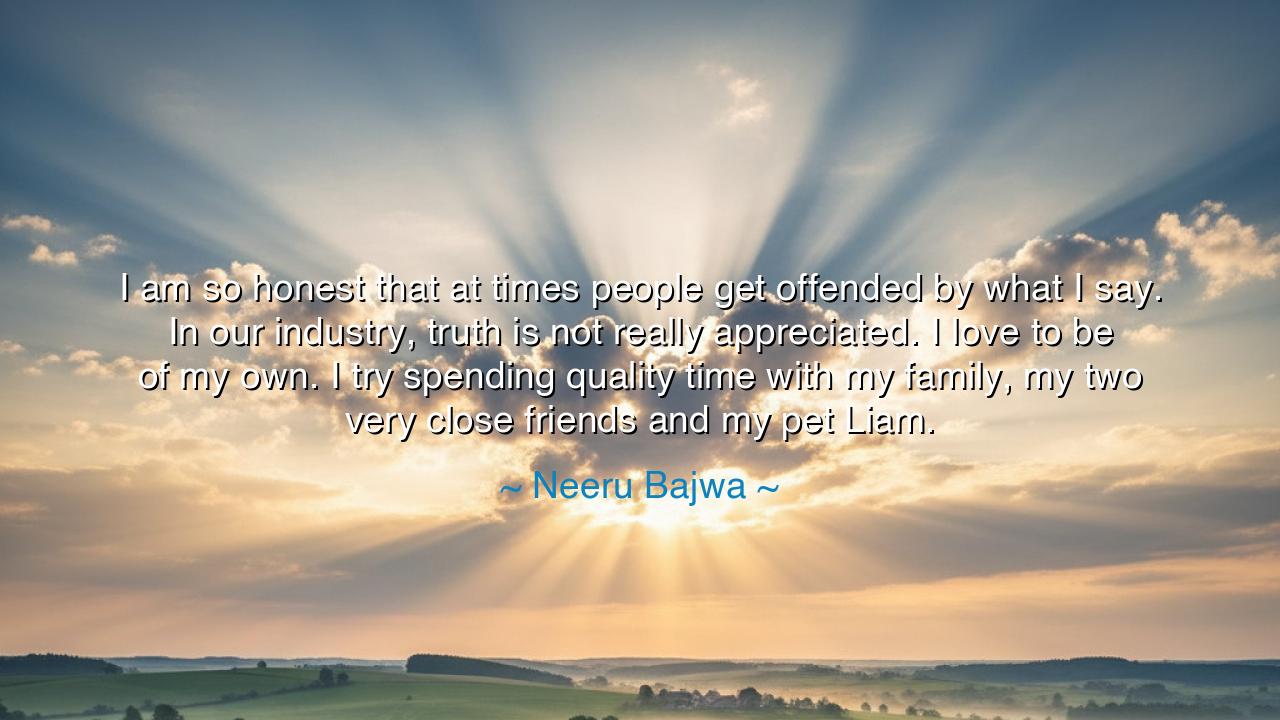
I am so honest that at times people get offended by what I say.
I am so honest that at times people get offended by what I say. In our industry, truth is not really appreciated. I love to be of my own. I try spending quality time with my family, my two very close friends and my pet Liam.






When Neeru Bajwa declared, “I am so honest that at times people get offended by what I say. In our industry, truth is not really appreciated. I love to be of my own. I try spending quality time with my family, my two very close friends and my pet Liam,” she was not merely describing her habits, but unveiling a principle of life: that integrity comes at a cost, that truth often wounds before it heals, and that amidst the noise of the world, one must retreat into circles of love and loyalty to remain whole. Her words are a testimony to the eternal struggle between outward success and inward peace.
The meaning is layered. To be radically honest is to refuse the masks that society, and particularly the world of fame, demands. Yet such candor can strike sharply at the pride or delusion of others, causing offense. Bajwa admits this freely, for she knows that in her industry—one built on illusions, appearances, and flattery—truth is often unwelcome. But she does not bow to this rejection. Instead, she chooses a narrower, nobler path: to live not for applause, but for authenticity, cherishing the few who know her truly.
History bears witness to the difficulty of truth-telling. Consider the fate of the philosopher Diogenes, who carried his lantern through Athens claiming to seek an honest man. His bluntness offended the powerful, his disregard for convention scandalized the citizens. Yet though mocked, he remained unbending, preferring the poverty of truth to the riches of deceit. Bajwa’s words echo this same spirit: it is better to offend with sincerity than to prosper through falsehood.
And yet her confession also reveals where strength is found. She turns not to crowds or superficial ties, but to her family, her two trusted friends, and even her beloved pet Liam. Here lies wisdom: when the world is hostile to truth, one must root themselves in bonds of loyalty and love. Empires may scorn honesty, but the hearth never does. It is in these intimate circles that the weary spirit is refreshed, and the soul remembers that life is not measured in fame, but in the depth of affection shared with a few.
The origin of this insight is not unique to Bajwa’s time or trade. Every age has known that truth-tellers are often loners, their companions few but steadfast. The prophets of old, the reformers, the visionaries—all were ridiculed by the many, yet sustained by the few who truly understood them. Thus, when she speaks of her small circle, she is aligning herself with a tradition as old as wisdom itself: to walk in truth is to walk a narrower road, but one lined with fidelity.
The lesson for us is clear: value truth, even when it costs popularity. If your honesty provokes offense, let it be offense born of integrity rather than deceit. And when the world proves unkind, return to the company of those who love you not for masks, but for your unvarnished self. For it is not the multitude that sustains us, but the chosen few—the family who endures, the friend who listens, the loyal companion who walks beside us.
In practical action, this means: do not chase endless approval. Speak truth kindly, but speak it nevertheless. Protect time with those who matter most, for they are the anchor that will hold you steady when the storms of rejection rise. And do not despise simplicity—whether it is an evening with loved ones, the counsel of a true friend, or the quiet companionship of a faithful pet. In these small sanctuaries lies a strength greater than applause.
Thus Neeru Bajwa’s words shine as a lamp for all who strive to live sincerely: “I am so honest that at times people get offended by what I say… I love to be of my own.” She teaches us that the price of truth may be loneliness, but it is a noble loneliness, softened by the warmth of real love. Better this, than the hollow company of those who prize lies above loyalty. To live in truth is to live in freedom, and to cherish the few is to possess riches the many will never know.






AAdministratorAdministrator
Welcome, honored guests. Please leave a comment, we will respond soon